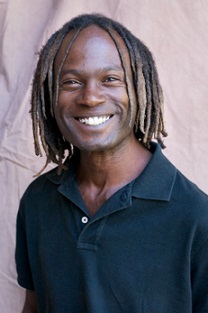
Lindon W. Barrett
Professor of English
Lindon W. Barrett, Professor of English at UC Riverside, 2007-8, and Professor of English and Comparative Literature and African American Studies at UC Irvine, 1990-2007, died in tragic circumstances at his home in Long Beach, CA, on July 7, 2008. He was 46.
Professor Barrett was born in Guyana on October 10, 1961, and moved with his family to England a year later, and then again to Winnipeg, Canada, in 1966. He received his B.A. at York University in 1983, his M.A. at University of Denver in 1986, and his Ph.D. at University of Pennsylvania in 1990, joining the faculty of English at UC Irvine shortly thereafter and rising to the rank of full professor by 2001.
Professor Barrett was a versatile scholar whose interests encompassed African American and African diaspora literature and culture; literary and cultural theory; lesbian, gay, and queer studies; and music, song, social dance, and other forms of popular and street culture. Though a lover of books from an early age, he insisted on the value of non-literary representations, especially music, song, and dance as records of suffering and pleasure exceeding what can be put into words. He believed it was not enough for scholars to critique current value systems and the priority accorded “rational speech”; instead, alternative values and systems had to be constructed to combat racism, sexism, and homophobia, and such work would have to involve the whole body, not just the head and heart. He dedicated his research, teaching, and service to those ends, developing his ideas in important articles and presentations on a wide range of figures and topics, from Ann Petry and Langston Hughes, to Dennis Rodman and Sylvester, to modernity and its dependence on slavery. He also served as a consultant to Steven Spielberg and Debbie Allen on the 1997 film Amistad.
His first book, Blackness and Value: Seeing Double, appeared in 1999 and was groundbreaking in its approach to the study of voice, music, authenticity, and value (1999), anticipating new directions in scholarship on the voice and African American culture. He died before he could complete his second book, Racial Blackness and the Discontinuity of Western Modernity, which turns from the focus on black expressive culture in the first book to the socio-economic, historical, and philosophical origins of the slave trade in its founding relation not only to the mercantilism that preceded and prepared for capitalism but also to Enlightenment modernity. A testament to the respect and esteem Professor Barrett’s work inspired, the book appeared posthumously in 2014 thanks to the editorial efforts of friends and colleagues Justin Joyce, Dwight McBride, and John Carlos Rowe. A volume of his essays, Conditions of the Present: Selected Essays, edited by Janet Neary, also has appeared posthumously.
Professor Barrett was a much sought-after speaker, sharing his work in numerous venues nationally and internationally. He was involved in a number of scholarly organizations, including the American Studies Association and the Modern Language Association, as well as the Critical Theory Institute at UC Irvine, and he served for three years as the associate editor of Callaloo, one of the leading journals in African diaspora studies. He devoted much of his time and energy to institutional change at UC Irvine and co-founded UC Irvine’s Program of African American Studies with Thelma Foote in 1994, chairing it from 2003-7; it achieved departmental status in 2016 thanks in large part to their labor. His institutional work has lived on in other ways at UC Riverside, with lectures in his honor and a selective summer research institute in his name that ran from 2012-15, funded by the UC-HBCU to help prepare undergraduates from historically black colleges and universities for doctoral study.
The latter was especially appropriate because he was a charismatic and inspiring teacher, learned but witty, and with an infectious smile to which students could not help but respond. One of his UC Irvine undergraduates summed up the experience of being in a course with him on a memorial web site: “They were the kind of classes that you would actually try to get there on time for so that you could grab a seat so as not to miss any of the brilliant, poignant, and hilarious things that Professor Barrett would say.”
He is survived by his parents, Dorothy and Leslie Barrett, his brother Leslie (Telethia), nieces Ashley (Scott), Gabrielle, Athalia, nephews Jason and Joshua, great-nephew Josiah, Aunt Claudette, Uncle Charles, Uncle Sidney, cousins Ann, Leslyn, Carron, Andre, Kizzy, Carol and Pauline and their families, the Roberts and Vigilance families.
This memorial was prepared by Carole-Anne Tyler, Associate Professor of English, with information from the UCR Chancellor; colleagues in the UCR English Department; colleagues at UCI, where Professor Barrett taught for many years, especially Professor John Carlos Rowe; The Press Enterprise; the Lindon Barrett Tributes blog at http://forlindonbarrett.blogspot.com/2008/07/from.html; and the KUCR 88.3 FM July 21, 2008 tribute, simulcast by KUCI and rebroadcast on July 28 and 29 and archived at http://kucr.org/2008/07/24/kucr-883fm-to-re-air-tribute-to-uc-riverside-professor-lindon-barrett/.
